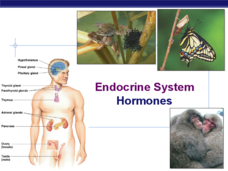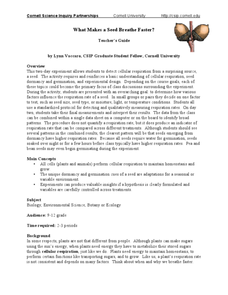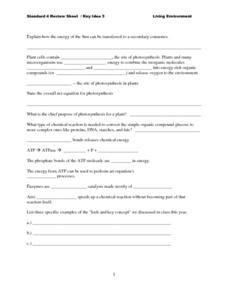University of Minnesota
Homeostasis of Thermoregulation
Whether you're battling the flu or trying to warm up on a chilly day, your body's ability to react to temperature change is fascinating! Anatomy scholars discover the fantastic feedback loops that control body temperature in a rigorous...
Curated OER
Maintaining the Internal Environment
Explore homeostasis in animals with this all-encompassing worksheet. Advanced biology pupils consider a variety of mechanisms for maintaining internal conditions such as temperature and waste products. Eighteen short-answer questions...
Curated OER
Comparing Pulse Rates
Young scholars participate in a lab that demonstrate one example of how the human body maintains homeostasis. Students collect data from themselves and observe how their own bodies react to exercise.
Serendip
Homeostasis, Negative Feedback, and Positive Feedback
So many bodily activities depend on homeostasis! Give learners a solid background to understand the basic process of the human body. Scholars first examine negative feedback loops contributing to body temperature regulation and then a...
Curated OER
AP: Chapter 44: Regulation of the Internal Environment
When nature calls, you need to answer. Physiology learners discover that it is a just your body's way of regulating pressure and water content. Along with osmoregulation, they also examine thermoregulation, two vital processes with which...
Science 4 Inquiry
Body in Balance
The human body maintains homeostasis through the interconnection of multiple systems. Young scientists match these connections and discuss how they relate to each other. They apply their knowledge to solve the mystery of a treasure hunter.
Curated OER
Homeostasis
In this homeostasis worksheet, learners answer twelve questions about positive and negative feedback loops and how they effect homeostasis.
Curated OER
Making Connections-Review Experimental Design and Homeostasis
In this experimental design and homeostasis worksheet, students complete 20 sentences with key terms about designing experiments, gathering data, graphing data and determining controls. They also complete sentences about homeostasis and...
Curated OER
The Nobel Prize in Chemistry 2003 - Information for the Public
An information-packed eight-page article detailing the history of understanding active transport across cell membranes makes up the bulk of this handout. Two pages of reading comprehension and critical-thinking questions follow. The...
Curated OER
Digestion and Nutrition
Debunk the theory that a soda-and-candy diet is a nutritionally sound concept! Learners first read 2 paragraphs of background information covering essential nutrients, digestion, and homeostasis. Then, they use the information they...
Rochester Institute of Technology
Heat Transfer
Use an exciting role play activity to teach young chemists about the importance of heat transfer in maintaining homeostasis. They assume the role of a dog sled owner who has been abandoned and must fend for themselves with only a few...
Curated OER
Cancer and the Cell Cycle - Biology Teaching Thesis
Identify the different stages of mitosis and what occurs in each stage with a straightforward biology lesson. Young scientists identify the importance of the cell cycle control in maintaining homeostasis, and then match the correct stage...
Curated OER
The Plasma Membrane
In this plasma membrane worksheet, students will explore how cells are able to maintain homeostasis and the function of the plasma membrane. This worksheet has 6 fill in the blank and 7 true or false questions.
Curated OER
Digestion and Nutrition
In this homeostasis instructional activity, students will read about how the food we eat helps our body to maintain homeostasis. Students will complete 1 short answer question and 3 true or false questions.
Curated OER
Endocrine System: Hormones
The many images and labeled diagrams in this PowerPoint will help learners understand different areas of the endocrine system. The slide
show starts with information about the absorption of lipid and protein based hormones, and then...
Curated OER
What Makes a Seed Breathe Faster?
Here's a five-star lesson plan in which inquisitors conduct sophisticated experimentation with cellular respiration in plant seeds. Placing seeds in a closed system they measure the amount carbon dioxide produced and relate it to...
Curated OER
Gas Exchange And Respiratory Systems.
Explore structures within the realm of gas exchange in terrestrial and aquatic life. The excellent, labelled diagrams and clear descriptions help your students view the different structures and adaptations that have developed. The 29...
Curated OER
Standard 4-Photosynthesis, Diseases and the Immune System
In this photosynthesis, disease and Immune System worksheet, high schoolers fill in the blanks with key terms to complete sentences about the transfer of energy from the sun to plants, enzymes as catalysts in reactions, homeostasis, the...
Curated OER
Human Body Regulation
Learners investigate how the human body self-regulates to maintain a stable internal environment despite changes in the external environment -- a process called homeostasis.
Curated OER
Are Adult Pancreatic Beta Cells Formed by Self-duplication or Stem Cell Differentiation?
A case-study of Dr. Melton's experiment on pancreatic cells highlights this worksheet. Details of the study adorn the first three pages, complete with diagrams. Biology buffs then analyze the data and identify problems within the...
Curated OER
Regulating the Internal Environment
This presentation begins with the many problems multicellular organisms which rely on diffusion encounter. There are many diagrams of mammalian organ structures, and they are labelled with their relevant functions. This an excellent...
Curated OER
Endocrine System - Hormones
Use this attractive PowerPoint to introduce all the hormones and their functions to your students. As students view each slide, they should be able to see the relevance of many of the chemicals and their interaction with the human body....
Curated OER
Heating and Cooling a Really Large Lizard
Remind your middle school scientists how fox ear size varies depending on the climate they live in; large ears allow heat loss while small ears keep heat in. Discuss how a cold-blooded animal might try to regulate body temperature. Then...
Curated OER
Regulation - Human Nervous and Endocrine Systems
Young scholars explore homeostasis within the nervous and endocrine system with this Smart Board activity. For this biology lesson plan, students will fill in the know and want to know sections of a KWL chart as a class using a Smart...

























